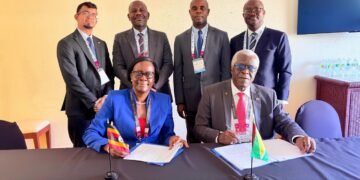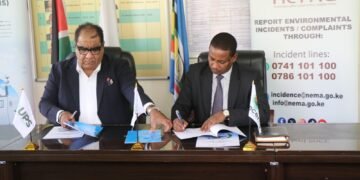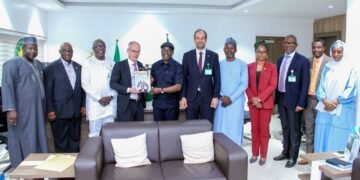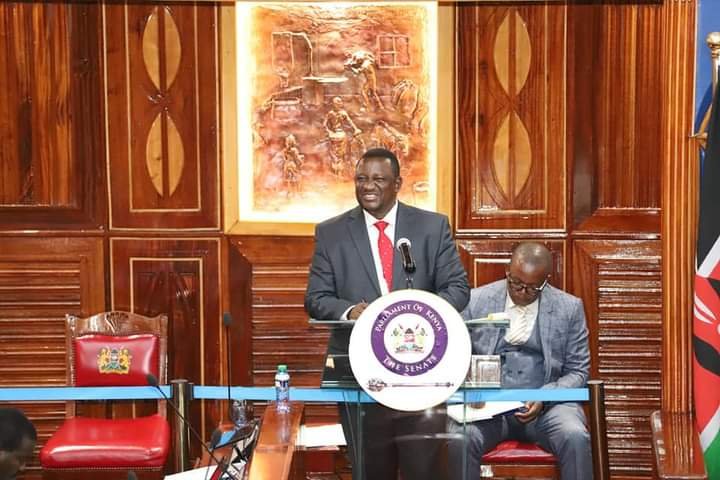The Cabinet Secretary for Mining, Blue Economy and Maritime Affairs Mr Salim Mvurya says reforms being undertaken by the Ministry will catapult Kenya into a desirable mining investment landscape and attract the best mining.
Among the reforms he mentioned include the conclusion of the National Airborne Geophysical and generation of a preliminary report identifying over 970 mineral occurrences across the country, initiating the process of ground trothing in prioritized 16 counties with critical and strategic minerals and the development of an in house, in-country mineral licensing system.
Under the system, the will have an online mining cadastral integrated with national institutions like Kenya Revenue Authority (KRA), e-Citizen, Business Registration Services among others.
The CS made the revelation when he appeared before the Senate to respond to questions raised by senators concerning the operations of his Ministry.
The first question was raised by Isiolo senator Fatuma Dullo who had wanted to know the rationale behind the decision by the government to impose moratorium on the issuance of mineral mining rights in the country.
Senator Dullo had further wanted the CS to explain the benefits that has accrued from the imposition of the moratorium and the plans put in place by the government to have the moratorium lifted in view of the negative impact it has had on the economy.
The second question was from Nominated senator Veronica Maina who wanted the CS to provide information on the state of infrastructure the government has put in place to facilitate the exploration of ocean renewable energy and the initiatives the Ministry has taken to enhance the exploration of offshore gas and oil.
Senator Maina also wanted to know the extent the government has invested in putting up of infrastructure for the country to explore and benefit from aquatic products, marine, aquaculture, and blue biotechnology.
She also wanted the CS to provide the number of Kenyan-owned fish vessels registered to operate in the Exclusive Economic Zone and state the measures put in place to enhance the participation of and investment by local fishermen in the Marine Exclusive Economic Zone.
Senator Maina wanted to know the quantity of marine produce landed in the existing landing sites, the measures put in place to accelerate the development of marinas along the Kenyan coast and inland lakes, and the state of construction of the landing sites in Liwatoni and their capacity to handle landed produce.
CS Mvurya told the House that the decision to place the moratorium was done in 2019 on the advice of the National Security Council (NSC).
“The rationale was to safeguard Kenya’s interests by developing the right data and eliminate speculation on the availability of substantial deposits,” he told the House.
He added that the moratorium was also meant to allow government to complete the mapping of mineral resource exercise without an influx of speculative mining licence applications that would have posed a threat to the Mining sector.
The CS told the House that development of an in-house and in-country licensing system will allow the government broader control of all mineral rights and ensure timely issuance of mineral rights as stipulated in the Mining Act.
“We have instituted a comprehensive audit of all mineral rights and weeded out all illegal licences, inactive, expired, idle and speculative hoarding to free up areas for serious investment and concessions,” the CS told the Parliament.
On the question on the lifting of the moratorium, the CS said the Ministry has put in place the necessary safe guards aimed at sustaining the gains already realized and inform decisions for lifting the moratorium.
“The Ministry is very positive the reforms it is currently undertaking will catapult Kenya into a desirable mining investment landscape and attract the best in mining,” he said.
He also revealed that there are over 800, 000 artisanal and small scale miners who play a big role in poverty eradication and socio economic development.
As a result, he government has identified formalization and capacity building of the players as a key priority under the Bottom-Up Economic Transformation Approach, which was President William Ruto election promise.
The Ministry has formed Artisanal Miners’ Cooperatives from over 420 identified Community Based organization and other groups in preparation for the issuances of mining permits.
“The Ministry is carrying out mapping of illegal mining areas, profiling activities and is liaising with other governmental agencies to curb illegal mining operations and restore order,” CS Mvurya told the House.






























































